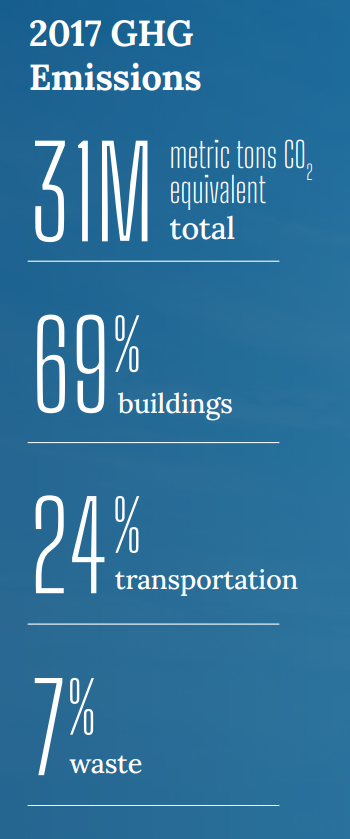Electrify Chicago
An independent tool for viewing City of Chicago building data
According to the
2022 Chicago Climate Action Plan,
69% of Chicago's emissions come from buildings, making
building emissions our biggest challenge and our biggest opportunity as a city
to tackle climate change. At Electrify Chicago, we showcase building performance using
publicly available data supplemented by community-submitted photographs and building
owners.
Start by looking at Chicago's buildings with the highest greenhouse gas intensity i.e. emissions per square foot. Large, efficient, buildings can perform much better than very inefficient small buildings on this metric.
New Article
📰 $30 Million In Missed Fines
The City Of Chicago failed to collect $30 million in potential fines from the building benchmarking ordinance, reducing transparency and accountability.
Legislative update! 🎉
As of late January 2024, legislation is being introduced to require new use more efficient forms of water and space heating, via the Clean And Affordable Buildings Ordinance (CABO), which will reduce the number of highly polluting and inefficient buildings that end up on this site.
If you're in Chicago,
write to your alderman to support the CABO!
Chicago Buildings by Greenhouse Gas Intensity
Note: Data includes large Chicago buildings with data from 2022, unless explicitly stated otherwise.
Note: This data only includes buildings whose emissions are reported
under the
Chicago Energy Benchmarking Ordinance. According to the City “As of 2016,
this list includes all commercial, institutional, and residential buildings larger than
50,000 square feet.” This dataset is also then filtered to only buildings with
reported emissions > 1,000 metric tons CO2 equivalent.
The latest year of data is from 2022, but we update the site regularly when new data is available, and some buildings may have failed to report that year, and only have older data available.
| Property Name / address | Primary Property Type |
Greenhouse Gas Intensity (kg CO2 eq./sqft) |
Total Greenhouse Emissions (metric tons CO2 eq.) |
|---|---|---|---|
|
Aon Center
🚩
200 E Randolph St
| Office | 6.1 kg/sqft
Lowest 45%
| 19,331 tons #14 Highest
|
|
1818 W PETERSON
1818 W PETERSON
| Multifamily Housing | 6.1 kg/sqft
Lowest 45%
| 672 tons
Lowest 38%
|
|
DePaul College Prep
🕰️
3633 N. California
| K-12 School | 6.1 kg/sqft | 1,236 tons |
|
The Sinclair
1201 N LaSalle Street
| Multifamily Housing | 6.0 kg/sqft
Lowest 42%
| 3,558 tons
Highest 10%
|
|
Aloft Chicago Mag Mile (Marriott)
🕰️
243 E Ontario St
| Hotel | 6.0 kg/sqft | 1,147 tons |
|
Vue53
🕰️
1330 E 53RD ST
| Multifamily Housing | 6.0 kg/sqft | 1,685 tons |
|
Town Hall
3600 N Halsted St
| Multifamily Housing | 6.0 kg/sqft
Lowest 42%
| 550 tons
Lowest 30%
|
|
Catherine Courts Condominium Association of Chicago (8439-8503 W. Catherine Ave)
🕰️
8439-8503 W. Catherine Ave
| Multifamily Housing | 6.0 kg/sqft | 906 tons |
|
Reside on Roscoe
532 W Roscoe
| Multifamily Housing | 6.0 kg/sqft
Lowest 42%
| 282 tons
Lowest 7%
|
|
Grace Street
635 W Grace St
| Multifamily Housing | 6.0 kg/sqft
Lowest 42%
| 761 tons
Lowest 44%
|
|
Henry Crown Field House
5550 S University Ave
| Fitness Center/Health Club/Gym | 6.0 kg/sqft
Lowest 42%
| 872 tons
Lowest 49%
|
|
900 North Franklin
🕰️
900 N Franklin St
| Office | 6.0 kg/sqft | 580 tons |
|
Stewart School Lofts
🕰️
4525 N Kenmore Ave
| Multifamily Housing | 6.0 kg/sqft | 565 tons |
|
Portage Park Elementary -CPS
(CPS)
5330 W Berteau Ave
| K-12 School | 6.0 kg/sqft
Lowest 42%
| 877 tons
Lowest 50%
|
|
Chicago Bulls College Prep
🕰️
(CPS)
2040 W Adams St
| K-12 School | 6.0 kg/sqft | 693 tons |
Data Source:
Chicago Energy Benchmarking Data
